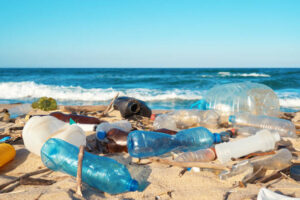
Why it's essential that we turn the tide
Plastic pollution has been a pressing issue for decades now, and it's high time we take action to turn the tide on this problem.
As we continue to use more plastic products in our daily lives, it's vital that we explore new ways of managing plastics sustainably.
In this blog, we'll dive into some promising solutions that are set to revolutionise how we produce, consume and dispose of plastics.
The initial problem
The problem of plastic pollution is not new, but it has gained increased attention in recent years as the volume of plastic produced each year has continued to grow.
According to the Worldwatch Institute, global production of plastic grew from 2.3 million tons in 1950 to 162 million tons by 1993.
In 2015, a staggering 448 million metric tons of plastic were produced worldwide—equal to the weight of almost 900 Empire State Buildings.
Most of this plastic is used only once and then discarded, resulting in mountains of waste that clogs landfills and oceans, endangers wildlife, and releases harmful chemicals into the environment.
While recycling and other forms of waste management can help to reduce the amount of plastic pollution, the best way to address the problem is to prevent plastic waste from being created in the first place. This will require a fundamental change in how we produce and use plastics.
Fortunately, there are already some promising initiatives underway that show what’s possible when businesses, governments, and consumers work together to rethink our approach to plastics.
The current status of plastic pollution
It's estimated that there are already around 150 million tonnes of plastic in our oceans – and that figure is only set to rise. If we don't take action now, it's predicted that there could be more plastic than fish in our seas by 2050.
One of the most distressing impacts of plastic pollution is on marine life. Animals can get entangled in discarded fishing nets or ingest plastics which block their digestive systems. Some estimates suggest that as many as 1 million seabirds and 100,000 marine mammals are killed by plastic pollution each year.
Sustainable plastic management strategies
Here are some easy ways to make a difference:
- Reduce your reliance on single-use plastics. Take a reusable water bottle with you when you go out, say no to straws, and invest in reusable shopping bags.
- Recycle as much plastic as possible. Most communities have recycling programs in place, so take advantage of them.
- Compost any organic waste instead of throwing it away in the bin. This includes food scraps, as well as garden waste.
- Advocate for change: write letters to your MP or join an environmental group to demand action on this issue. Education is also key – talk to your friends and family about the importance of sustainability and reducing our reliance on plastics. Together we can make a difference in the fight against plastic pollution.
Reducing our reliance on plastic
There are a number of ways we can reduce our reliance on plastics and make more sustainable choices. We can start by refusing single-use plastics, supporting businesses that use sustainable packaging, and recycling or reusing plastic products whenever possible. We can also press government for stricter regulations on the production and disposal of plastics.
By making more conscious choices about the way we use plastic, we can help protect our environment and ensure a brighter future for generations to come.
The way ahead for sustainable plastic management
- Plastic-to-fuel conversion turns waste plastic into a valuable fuel source. This could help to offset the environmental damage caused by the production and disposal of plastics, as well as provide a much-needed boost to the renewable energy sector.
- Biodegradable plastics are made from natural materials and break down much more easily than conventional plastics. This could drastically reduce the amount of plastic waste that ends up in landfill or polluting our oceans.
Of course, reducing our reliance on plastic altogether is still the best way to reduce its environmental impact. But with these new technologies emerging, it seems that sustainable management of plastic may finally be within our reach.
- Then there is “Chemical recycling” which breaks down plastics into their component molecules, which can then be used to create new plastics. This process is still in its early stages, but it has the potential to revolutionise the way that we recycle plastics.
- Product stewardship is the idea that manufacturers have a responsibility to design products that are safe and easy to recycle or dispose of responsibly. This concept is gaining traction as more companies realise that sustainability can be good for business.
And, the future...?
The future of sustainable plastic management is bright and with the right initiatives, we can turn the tide on pollution.
Our goal should be to reduce our plastic consumption and invest in renewable resources that are reusable so that we can have an eco-friendlier way of life.
It will take much effort from us all to ensure that these changes take place, but with collective action and determination, it is certainly possible to leave behind a brighter future for generations to come.
Carl Dodd, Property Revolutions Ltd.

